Rarely is revenge so sweet. Stephen King’s Pet Sematary is notorious for being the book that King thought was too scary to be published, and that one idea became its entire marketing campaign when King refused to do any interviews or publicity to support it. He refused not because Pet Sematary was “too scary,” but because it was his final flipped bird to Doubleday. It was a contractual obligation book that had been sitting in a drawer for years that he only released grudgingly and, strangely enough, it became his first mega-blockbuster. The last Stephen King book Doubleday had published was The Stand and they’d barely printed 50,000 copies, while holding their noses. This time they acknowledged his success by printing ten times that number and rolling out a massive ad campaign. But it was about more than just revenge. In an interview given one year after Pet Sematary was released, King said, “If I had my way about it, I still would not have published Pet Sematary. I don’t like it. It’s a terrible book—not in terms of the writing, but it just spirals down into darkness. It seems to be saying that nothing works and nothing is worth it, and I don’t really believe that.” Really? Because that’s what he’s been writing about all along.
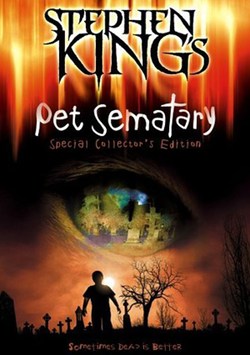 Not since The Shining had a book been rooted in events so close to King’s own life. In 1978, the same month that Doubleday released The Stand, King moved his family to Orrington, Maine so that he could spend a year teaching creative writing at the University of Maine, Orono as a way of giving back to his alma mater. Their house was on the edge of Route 15, a heavily trafficked road, and King and his wife, Tabitha, were constantly worried that their youngest son might run out into traffic. It turned out that it wasn’t his son he had to worry about. On Thanksgiving Day a car killed his daughter’s cat, Smucky, leaving her so upset that King considered telling her that the cat had run away instead. Smucky was buried with full honors at the local pet sematary (misspelled in the original sign) maintained by a group of neighborhood children. The “sematary” had been created communally years before, it was located up a wooded path behind the King’s house, and it was so quiet that King would sometimes take a lawn chair out there to sit and write.
Not since The Shining had a book been rooted in events so close to King’s own life. In 1978, the same month that Doubleday released The Stand, King moved his family to Orrington, Maine so that he could spend a year teaching creative writing at the University of Maine, Orono as a way of giving back to his alma mater. Their house was on the edge of Route 15, a heavily trafficked road, and King and his wife, Tabitha, were constantly worried that their youngest son might run out into traffic. It turned out that it wasn’t his son he had to worry about. On Thanksgiving Day a car killed his daughter’s cat, Smucky, leaving her so upset that King considered telling her that the cat had run away instead. Smucky was buried with full honors at the local pet sematary (misspelled in the original sign) maintained by a group of neighborhood children. The “sematary” had been created communally years before, it was located up a wooded path behind the King’s house, and it was so quiet that King would sometimes take a lawn chair out there to sit and write.
During this period, he began to write Pet Sematary after wondering what would happen if Smucky came back to life. When he was finished he gave the manuscript to his wife who reportedly hated it. He passed it along to Peter Straub who said the same thing. And so King, who had had a hard time writing the book (especially its infamous exhumation scene), put it in a drawer and wrote The Dead Zone instead. He didn’t think about Pet Sematary again until years later when he realized that Doubleday was screwing him.
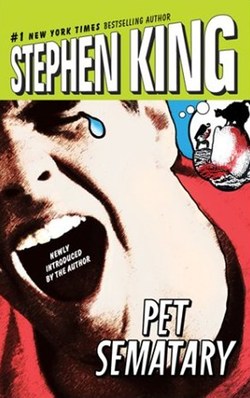 Back when he signed his boilerplate contract with Doubleday, King had been enrolled in their author investment plan, ostensibly to protect him from taxes. Doubleday, along with several other publishers, would invest their authors’s royalties for them, holding their money in trust and paying them only $50,000 per year. Ten years later, there was a problem: King had too much money. There was $3 million in his Author Investment Plan already, and even if the income on his first four books dropped to zero it would still take Doubleday 60 more years to pay him out at the current rate. He sent them a letter asking for his money back, noting that they were no longer his publisher. Doubleday refused, claiming that without “due consideration” the IRS would force them to return Author Investment Fund monies to all their authors on request. They also helpfully explained what they meant by “due consideration”—they wanted two more books. King, desperate to be shut of them, gave them one: Pet Sematary.
Back when he signed his boilerplate contract with Doubleday, King had been enrolled in their author investment plan, ostensibly to protect him from taxes. Doubleday, along with several other publishers, would invest their authors’s royalties for them, holding their money in trust and paying them only $50,000 per year. Ten years later, there was a problem: King had too much money. There was $3 million in his Author Investment Plan already, and even if the income on his first four books dropped to zero it would still take Doubleday 60 more years to pay him out at the current rate. He sent them a letter asking for his money back, noting that they were no longer his publisher. Doubleday refused, claiming that without “due consideration” the IRS would force them to return Author Investment Fund monies to all their authors on request. They also helpfully explained what they meant by “due consideration”—they wanted two more books. King, desperate to be shut of them, gave them one: Pet Sematary.
King handed over the manuscript and washed his hands of the matter, refusing to do any publicity or promotion for the book. Didn’t matter. Doubleday bragged about their first printing of 500,000 copies (actually only 335,000 copies) and Pet Sematary went on to sell a smooth 657,000 copies in hardback its first year. The book remains popular with King’s fans both for the obsessive morbidity that runs through it (King did extensive research on burial customs while writing the book) but also for its commitment to follow his dark vision wherever it went. And it went somewhere pretty dark.
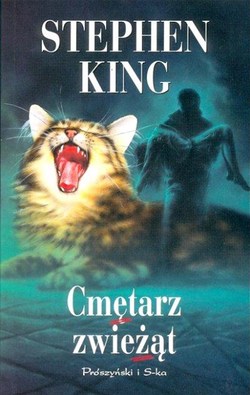 The book opens when Louis Creed and his family—wife Rachel, daughter Ellie, toddler son Gage—move from Chicago to a house in Ludlow, Maine where Louis has taken a job as head of the local university’s infirmary. Route 15 passes right by their house, and he and his wife are terrified Gage might run out in the road and get hit by a passing truck. Across the street live the charming, elderly, homespun Jud Crandall and his wife, Norma. The Creeds quickly come to feel like they’ve “come home” and sink into blissful domesticity until Ellie’s cat, Churchill, is hit by a car on Route 15. Knowing Ellie will be devastated by the loss of her pet, Jud takes Louis into the woods to “do him a favor.” The local kids have built and maintained a “pet sematary” (misspelled on their sign) behind the Creed home, on the edge of the enormous North Ludlow Woods, but behind this cemetery is a hidden trail that leads to a secret Native American burial ground built long ago by the Micmac tribe. Louis buries Churchill there, and the cat comes back to awkward life.
The book opens when Louis Creed and his family—wife Rachel, daughter Ellie, toddler son Gage—move from Chicago to a house in Ludlow, Maine where Louis has taken a job as head of the local university’s infirmary. Route 15 passes right by their house, and he and his wife are terrified Gage might run out in the road and get hit by a passing truck. Across the street live the charming, elderly, homespun Jud Crandall and his wife, Norma. The Creeds quickly come to feel like they’ve “come home” and sink into blissful domesticity until Ellie’s cat, Churchill, is hit by a car on Route 15. Knowing Ellie will be devastated by the loss of her pet, Jud takes Louis into the woods to “do him a favor.” The local kids have built and maintained a “pet sematary” (misspelled on their sign) behind the Creed home, on the edge of the enormous North Ludlow Woods, but behind this cemetery is a hidden trail that leads to a secret Native American burial ground built long ago by the Micmac tribe. Louis buries Churchill there, and the cat comes back to awkward life.
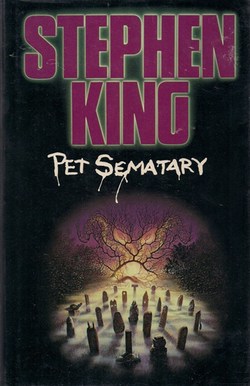 Something seems “off” about Churchill, and people instinctively avoid its presence, but Ellie is overjoyed that her cat is alive, even though she complains that he smells bad. Soon afterwards the Creed family’s blissful existence is shattered more finally when Gage runs out in the road and is hit by a truck. Louis sends Rachel and Ellie to her parents in Chicago, secretly exhumes Gage from his grave, and reburies him in the Micmac burial ground. Gage comes back to life as a scalpel-wielding monster, kills Jud, kills and eats his mother, and is ultimately killed by Louis. Bereft and shell-shocked, and possibly possessed by the dark forces that animate the burial grounds, Louis buries Rachel there, and the book ends with her coming back from the dead, presumably to kill him.
Something seems “off” about Churchill, and people instinctively avoid its presence, but Ellie is overjoyed that her cat is alive, even though she complains that he smells bad. Soon afterwards the Creed family’s blissful existence is shattered more finally when Gage runs out in the road and is hit by a truck. Louis sends Rachel and Ellie to her parents in Chicago, secretly exhumes Gage from his grave, and reburies him in the Micmac burial ground. Gage comes back to life as a scalpel-wielding monster, kills Jud, kills and eats his mother, and is ultimately killed by Louis. Bereft and shell-shocked, and possibly possessed by the dark forces that animate the burial grounds, Louis buries Rachel there, and the book ends with her coming back from the dead, presumably to kill him.
At first glance, Pet Sematary is little more than an extended riff on W.W. Jacob’s classic horror story “The Monkey’s Paw,” with some EC Comics style grue spread on top. But in the long walk to the Micmac burial ground that Louis and Jud take, the book’s concerns become more than apparent. The walk is a hallucinatory trek through the woods, haunted by phantom sounds, disturbing visions, and ending with an encounter with the Wendigo, a Native American spirit that brings madness and cannibalism in its wake, a creature so enormous that they can barely see past its legs as it moves past them in the woods. The Micmac burial ground has gone “sour” as a result of burying people there who were possessed by this spirit of cannibalism, and the reason the dead come back “polluted” is because of the Wendigo’s influence.
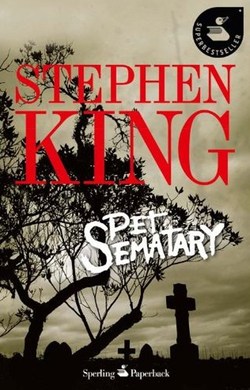 When King was writing Pet Sematary the Micmac Indians were much in the news. In 1980 the United States government finally passed the Maine Indian Claims Settlement, which recognized ownership of Maine lands by Native Americans and gave two recognized tribes $81 million, ostensibly to buy back their lands but more like a pay-off for them to drop their claims to lands which had, until then, been in private hands. It was a hard-fought case that resulted in a lot of tension and the Micmacs were excluded from this settlement until 1992, when they were given $900,000 and equal recognition. These headlines were definitely on King’s mind when he wrote Pet Sematary, and he even has Jud mention to Louis that the North Ludlow Woods, “Ends up going onto those state lands I told you about, the ones the Indians want back.”
When King was writing Pet Sematary the Micmac Indians were much in the news. In 1980 the United States government finally passed the Maine Indian Claims Settlement, which recognized ownership of Maine lands by Native Americans and gave two recognized tribes $81 million, ostensibly to buy back their lands but more like a pay-off for them to drop their claims to lands which had, until then, been in private hands. It was a hard-fought case that resulted in a lot of tension and the Micmacs were excluded from this settlement until 1992, when they were given $900,000 and equal recognition. These headlines were definitely on King’s mind when he wrote Pet Sematary, and he even has Jud mention to Louis that the North Ludlow Woods, “Ends up going onto those state lands I told you about, the ones the Indians want back.”
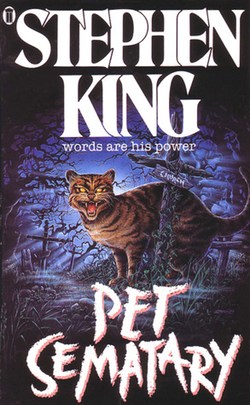 Although it’s never explicitly stated, it’s implied that the Micmac burial ground went sour when white settlers came, and while that might sound like projecting anti-colonial politics where they don’t belong, this is something King has been writing about for a long time. Pet Sematary would be the third Stephen King book in which the main characters are somehow cursed by Native Americans: the first was The Shining, with the Overlook Hotel built on Indian burial grounds, the second was Firestarter with the deranged Native American killer, John Rainbird, stalking Charlie McGee, and now Pet Sematary, which follows the familiar arc of the pioneer novel. The Creed family move from urban Chicago to the edge of the unknown wilderness, just like settlers in old cowboy fiction, and Jud even says at one point, “I know it’s funny to say your nice little house there on the main road, with its phone and electric lights and cable TV and all, is on the edge of a wilderness, but it is.” It’s the typical American frontier narrative: here is the safe and warm family home, and just beyond it lies the unsettled wilderness full of dark things. It’s what Nathaniel Hawthorne wrote about on a regular basis, and it’s what King’s been writing about for his entire career.
Although it’s never explicitly stated, it’s implied that the Micmac burial ground went sour when white settlers came, and while that might sound like projecting anti-colonial politics where they don’t belong, this is something King has been writing about for a long time. Pet Sematary would be the third Stephen King book in which the main characters are somehow cursed by Native Americans: the first was The Shining, with the Overlook Hotel built on Indian burial grounds, the second was Firestarter with the deranged Native American killer, John Rainbird, stalking Charlie McGee, and now Pet Sematary, which follows the familiar arc of the pioneer novel. The Creed family move from urban Chicago to the edge of the unknown wilderness, just like settlers in old cowboy fiction, and Jud even says at one point, “I know it’s funny to say your nice little house there on the main road, with its phone and electric lights and cable TV and all, is on the edge of a wilderness, but it is.” It’s the typical American frontier narrative: here is the safe and warm family home, and just beyond it lies the unsettled wilderness full of dark things. It’s what Nathaniel Hawthorne wrote about on a regular basis, and it’s what King’s been writing about for his entire career.
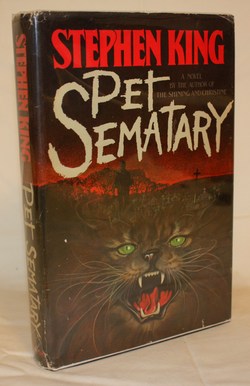 King’s writing resonates because at its heart is an idea that we all secretly feel is true: our safety is an illusion. No matter how warm and safe the Creed family home feels, it can be invaded at any moment by death. Louis sentimentalizes death as a natural part of life, but when it suddenly reaches out and claims his daughter’s cat, his son, and his wife, his first reaction is to fight it at all costs. His being at peace with death was a lie, and so was his sense of safety. In fact, the Creed family is built on lies. Rachel has kept the death of her terminally ill sister, Zelda, a secret for years because it traumatized her too deeply and now she and her parents pretend her sister never existed, convinced that this shameful secret will destroy their family if it’s talked about. Louis, for his part, has kept secret his father-in-law’s attempt to bribe him not to marry Rachel. Their family unit only feels safe and secure as long as they keep these secrets from one another. As long as they don’t think about the Micmac burial ground behind their house. As long as they don’t think about death.
King’s writing resonates because at its heart is an idea that we all secretly feel is true: our safety is an illusion. No matter how warm and safe the Creed family home feels, it can be invaded at any moment by death. Louis sentimentalizes death as a natural part of life, but when it suddenly reaches out and claims his daughter’s cat, his son, and his wife, his first reaction is to fight it at all costs. His being at peace with death was a lie, and so was his sense of safety. In fact, the Creed family is built on lies. Rachel has kept the death of her terminally ill sister, Zelda, a secret for years because it traumatized her too deeply and now she and her parents pretend her sister never existed, convinced that this shameful secret will destroy their family if it’s talked about. Louis, for his part, has kept secret his father-in-law’s attempt to bribe him not to marry Rachel. Their family unit only feels safe and secure as long as they keep these secrets from one another. As long as they don’t think about the Micmac burial ground behind their house. As long as they don’t think about death.
Even Jud and Nora Crandall’s 50-year marriage, which Louis and Rachel idolize, turns out to be built on lies. When the dead come back from the Micmac burial ground they are possessed by secret knowledge that they use to torment the living. When Gage comes back from the dead he reveals that not only was Jud secretly visiting prostitutes throughout his marriage, but Nora was having an affair with more than one of Jud’s friends. Neither ever learned the others’s secret, and so it seems their marriage wasn’t built on love and devotion, but secrets and lies. (There is no reason to doubt Gage, since these revenants have never lied before in the book.)
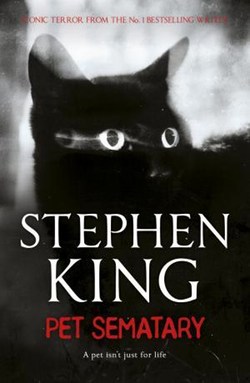 This could all be read as an uncomfortable othering narrative: nice white people settle down and an evil native curse ruins their lives. But King makes it explicit that the evil is the result of the settlers, not the indigenous people. The settlers were the ones who made the land go sour in the first place. As Jud says repeatedly to Louis, “What you bought, you owned, and what you owned eventually came home to you.” We bought America, and the parts of it we spoiled are the parts we own, and eventually we’ll have to pay for them. But there’s also a more subtle idea here, and it’s part of what animates so many of King’s books. The land is older than we are, and while most of it can be divided up into plots and lots, there are other parts that resist this division. There are indeterminate parts of the land that fall between the borders, and they were part of the sale, too.
This could all be read as an uncomfortable othering narrative: nice white people settle down and an evil native curse ruins their lives. But King makes it explicit that the evil is the result of the settlers, not the indigenous people. The settlers were the ones who made the land go sour in the first place. As Jud says repeatedly to Louis, “What you bought, you owned, and what you owned eventually came home to you.” We bought America, and the parts of it we spoiled are the parts we own, and eventually we’ll have to pay for them. But there’s also a more subtle idea here, and it’s part of what animates so many of King’s books. The land is older than we are, and while most of it can be divided up into plots and lots, there are other parts that resist this division. There are indeterminate parts of the land that fall between the borders, and they were part of the sale, too.
The Wendigo personifies this kind of indeterminate existence. It’s referred to as a disembodied curse, as a giant monster, as a hallucination, and as the spirit of cannibalism. It exists as several things at once, it is between boundaries, neither fully alive nor dead, neither here nor there. In King’s books there are always these kinds of places where the borders blur. The Overlook Hotel is one of them, the Dead Zone that Johnny sees in his dreams is another, the club at 249B East 35th Street in “The Breathing Method” is a third. There are also characters who blur, like Randal Flagg in The Stand, turning from man to devil to crow, or any of King’s characters, Louis Creed included, who start out as one thing (a nice all-American boy, a devoted husband) and wind up as another (a political assassin, a murderous Nazi-worshipper, a man who causes the death of his entire family). In King’s fiction, a secure identity, one that’s stable and reliable, usually turns out to be a lie that we believe in because it’s convenient, not because it’s an immutable fact.
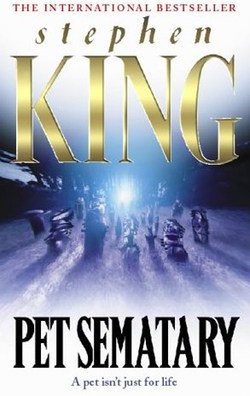 King’s point has always been that there are older forces out there, forces that came with the territory, and they’re right beneath the surface, waiting to claim us when they’re ready. Therefore, it’s not horror that is the act of imagination but our reality—family, home, economic security—that is imaginary. These things exist purely as an act of faith, we believe in them against the evidence of our senses. Because if we don’t then we look down and see that there’s nothing to keep us from falling screaming into the void. The line that separates human from monster, life from death, or best-selling author living in a mansion from penniless drunk living in a mobile home, is always far, far thinner than we think. In fact, it’s pretty much just a figment of our imaginations. And as a toiler in the fields of the imaginary, that’s something Stephen King understood better than most.
King’s point has always been that there are older forces out there, forces that came with the territory, and they’re right beneath the surface, waiting to claim us when they’re ready. Therefore, it’s not horror that is the act of imagination but our reality—family, home, economic security—that is imaginary. These things exist purely as an act of faith, we believe in them against the evidence of our senses. Because if we don’t then we look down and see that there’s nothing to keep us from falling screaming into the void. The line that separates human from monster, life from death, or best-selling author living in a mansion from penniless drunk living in a mobile home, is always far, far thinner than we think. In fact, it’s pretty much just a figment of our imaginations. And as a toiler in the fields of the imaginary, that’s something Stephen King understood better than most.
Grady Hendrix has written about pop culture for magazines ranging from Playboy to World Literature Today. He also writes books! You can follow every little move he makes over at his blog.










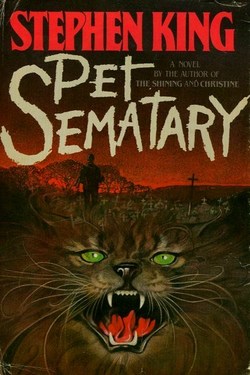
Now that the re-read of this book is over, let’s now listen to the song by the Ramones! Because any time I see anything to do with this book, I just can’t get that song out of my head…
When I was a kid, this was probably my favorite King novel. I still like it alot, but its hard to read now that I have kids. Real hard. I still love the black humor, the setting, the atmosphere and even the really detailed (and to me interesting) break down on how a graveyard works.
I think a theme that runs through the book is the nature of death, sometimes Jud is right and ‘dead is better’. Sure, you see that in the reaminations, but also with Zelda and to a lesser degree with Nora when she dies. Death is an end, but an ending can be a good thing, or at least not a tragedy.
For me, the most intense scene in the book doesnt come from the reanimations or the walk to the burial ground, its the fight at the funeral home. That’s a gutpunch (pun not intended).
1. Nitpick: the burial ground reference was only in the movie of The Shining, not the book.
2. “…there are older forces out there … right beneath the surface, waiting to claim us when they’re ready”: in King it’s usually more like “when we’re ready.” Nothing sneaks up and ambushes Louis; he’s one of the best-warned characters ever in horror fiction (unlike the couple in “The Monkey’s Paw”, who don’t know ahead of time that they’re in that kind of story). And the dangerous frontier he has to cross is more mental than physical, a big pile of deadwood that turns out to be no big deal to climb over as long as you just don’t worry about it.
3. The different interpretations in the book covers continue to be interesting. The covers for Christine were surprisingly good, while the third one on this page is… really not. Wow.
I loved this book as a teen and still love it. “Pet Semetary” is, to me, King’s most overtly “Lovecraftian” book: it takes place in rural New England, it deals with unseen entities, it have a growing sense of hoplessness and no one comes out okay in the end. The land is spoiled and good intentions get perverted and ultimately amount to nothing.
I agree with joyceman, that it’s hard to read, or even ponder, as a parent; but, it deals with issues like “fear of death” in a very candid way. There is so much death in this book and not “death” like in most horror novels but very grounded, ugly, emotional death. Starting with Pascow and continuing through Jud’s stories and the end.
Speaking of Jud’s stories, I love this aspect of the book. Honestly, I love any part of a King novel where he delves into a place’s ugly history. He really is a master of world-builing.
I have to quibble with a number of things in this review. I almost have to wonder if we read the same book:
1. Ellie was not “overjoyed that her cat is alive.” She’s repelled by Church almost immidiately. While she was previously worried about the possibility of Church dying, almost as soon as she sees the resurrected Church, she tells Louis that she could handle it if he died, and you almost got the impression she wanted to. I got the impression that while he may have been her cat before, she wanted as little to do with him as possible after. Louis has to almost willfully forget this in order to go through with his plans later; he’s knows in his heart that bringing Gage back won’t bring joy to anyone.
2. As far as I recall, white settlers do not figure at all in the story of the Wendigo and the Micmac burial ground. I guess the idea that the coming of Whites is what caused the ground to go sour is a possible interpretation, but it is far from obvious or explicit. It seems far more likely that it was the sins of the Micmacs themselves (specifically their cannibalism and the desire to blame it on an outside force) that caused the problems.
3. Neither the Creed family nor Jud and Norma’s marriage were based on lies. Yes, everyone has their secrets, but revelation of those secrets wouldn’t destroy the families. In most cases they’re being kept precisely to protect the feelings of those the secret is being kept from. Saying that Jud and Norma’s marriage was all about Jud’s visiting prostitutes and Norma’s affairs is to miss the point and fall into the same trap that the Wendigo wanted people to: focus on the evil, forget about the good.
All I have to say is a paraphrased quote from Grant Morrison: Only a teenager confuses cynicism with realism. The notion that everything bad, painful, and terrible in life is the only solid, ultimate reality and everything joyous, loving, and good is just lies and sentiment -isn’t- all that deep or powerful an idea. It’s just the one our insecure inner adolscent latches onto, out of fear and pessimism.
The Smucky story is true, but King also almost lost his son Owen on the same road, barely catching him before he landed on the highway. Pet Sematary is the resulting what-if. He relates that in On Writing.
Interesting write-up, as always.
The part just as Louis almost catches Gage and we get a quick one-paragraph future biography of his life that now won’t happen brought tears to my eyes even as a teen — I don’t think I’m going to re-read this as a parent.
Earl Rogers, given King’s own criticism of the book, it would seem he would agree.
EliBishop – ya got me. You’re right. My brain had been so colonized by Pet Sematary that I had Indian burial grounds on the brain. But you’re 100% correct: it’s the movie of The Shining that says that, not the book.
Also, I agree that Louis really does have to do a lot of heavy lifting to find his fate, but something in Pet Sematary that I’d forgotten before this re-read is the idea that the burial ground is reaching out and causing these things to happen (an idea I don’t love). Jud talks about how the burial ground has a hold on him and makes him show it to Louis, the truck driver claims that his foot went down on the gas against his will before he runs over Gage, and Louis mentions a few times that he feels a power pulling him to the burial ground. In a way it makes the book weaker since the things that happen are caused by an outside force, not the characters’s decisions, but I think the bigger point is that the burial ground, like death itself, can reach out at any time and take someone, even if we don’t want it to.
Lsana – thanks for the comment. Ellie does start to hate Church in pretty short order, but she is dying to see him when she comes back, and the first thing she does when she gets home is call him and scoop him up and hug him. After that she cools. I didn’t feel like I had room to get into her cooling affections since the important thing for the story is that the crisis of the dead cat is averted. And you’re totally right that Louis has to ignore this and a lot more to do what he does with Gage and especially with Rachel. I like the idea that he’s deluding himself, but King also drops in the idea of the burial ground compelling him to do this stuff.
The Wendigo definitely wanted to focus on the bad and ignore the good, and while both marriages probably would have survived the revelation of the secrets, the people keeping the secrets didn’t feel that way. They think that their marriages will change permanently for the worse if their secrets are revealed – Jud says as much, and so does Rachel. But that’s the power of secrets, they always seem so much worse to the people keeping them.
The land “souring” isn’t explicitly linked to the arrival of colonists, but it’s linked in the book to the starvation the Micmac experience, and there is really only one famous bout of starvation by the Micmac. It started in 1763 and lasted until the middle of the 19th century (and in some ways it was only alleviated by great numbers of them dying), and its causes were all linked to the arrival of colonists. I’m reading between the lines a bit, but I think it’s a fair stretch.
It’s something I have to imagine King was aware of, given the research he did for the book, but I am wrong about 99% of the time!
This book has one of my favourite King lines in it – when Jud and Louis come upon a set of steps cut out of a scarp face immediately before reaching the original burying ground, and while they’re climbing Louis wonders if the Micmacs were “tool-bearing Indians”.
Actually trying to imagine the other kind of Indian – the non-tool-bearing ones, the ones that had to do absolutely everything with nothing more than their teeth and nails, everything – bring down prey, dress carcasses, make canoes, start fires, build shelters – was good for a laugh but kind of vitiated the increasing suspense.
I first read this book as a teenager on holiday in the west of Ireland, in a rented house at the bottom of a hill, with some very dark woods around. It scared the living daylights out of me, purely on atmosphere, there being no small children or cats in the house, or any main roads nearby. I’d still rather not re-read it, given that experience, but it’s interesting to read your review as an adult and see what it was that scared me so.
Also, this book really does seem to invite cover artists to do six million variations on ‘scary cat’, doesn’t it? The seventh one has particularly creepy, odd eyes.
This is the only novel Stephen King has every published for the general audience that I’ve never read. The darkness that he speaks of has always been tangible to me in the copies themselves. Whenever I’ve gone to pick it up, I’ve always ended up putting it down again. I just haven’t ever wanted to go there.
Grady @10: “Jud talks about how the burial ground has a hold on him and makes him show it to Louis, the truck driver claims that his foot went down on the gas against his will before he runs over Gage … In a way it makes the book weaker since the things that happen are caused by an outside force, not the characters’s decisions…”
I think you’re oversimplifying in a way that makes it sound weak, and King is up to something more interesting.
The truck driver doesn’t say it was against his will; he just “felt like putting the pedal to the metal” for no real reason, the kind of bad idea drivers sometimes get. And Jud’s speech to Louis is all about not being able to tell the difference between your own bad ideas and the power of the place. “You do it because it gets hold of you. You do it because that burial place is a secret place, and you want to share the secret”: the second sentence makes the first one ambiguous— is what “gets hold of you” something outside you, or just the natural obsession with anything that’s a secret thrill? Through that whole speech, while he’s telling Louis how dangerous this is and how you can’t trust your own judgment, he still keeps interrupting himself with rationalizations as to how it might not be so bad after all— driven by a real compassion for Louis and his daughter. It’s all very creepy and it strongly suggests that dark forces may be in control, but it never lets you know for sure, because none of it is out of character at all. And that’s a scary idea.
It’s awfully reminiscent of something many of us know from real life, and certainly King did: the way an addict can rationalize nearly anything in order to get the thing he won’t quite admit he craves, and to downplay the damage that’s been done, even while sort of acknowledging that there’s something wrong. Sometimes that means finding someone with the same weakness, to share with in the worst way. When two such people meet, it can be impossible to tell where their bad ideas come from, because they’re so good at talking each other into things.
The ambiguity about will and motivation even extends to the characterization of the burial ground itself. The Wendigo is involved, but it’s hard to say if it’s running the show deliberately; when Louis almost sees it in the woods, it seems like it’s just wandering around at random, not really caring who it curses with its presence. The curse of the Wendigo is cannibalism, and the burial ground wants human flesh; does that mean the ground is somehow like us, just another victim of the curse? Jud says “the ground had gone sour,” and later he compares it to “the soil of a man’s heart.” If it’s got something in common with us, then its power over us isn’t so much like a manipulative god; it’s more like the way damaged people can drag other people down in order to “share” that thrilling, toxic secret.
Earl Rogers @6: I totally agree with everything you said, but I can’t tell whether you think that’s King’s attitude in the book; if so, I think you’re wrong there. Grady’s last paragraph is too much of a stretch.
King does suggest that there’s all kinds of awful stuff we’re unaware of, and he may flirt with the idea that our life is a flimsy illusion… which is an appropriate thing for a horror writer to do, to tease us with fears we’re all familiar with; as you say, it’s a pretty basic adolescent reflex. But I really don’t think he believes “there’s nothing to keep us from falling screaming into the void.” He depicts love and courage as real things that stand a fighting chance even if the rest of your life is laid to waste, and unlike Lovecraft*, he doesn’t say that you’re better off not looking. Even in dark dark dark books like Pet Sematary and Thinner, it’s usually the case that even though some awful things may happen to you, you’ll get yourself into much worse horror and despair if you can’t look honestly at your situation. He treats despair and existential dread as emotions people experience in extreme situations, and he writes about them convincingly, but not as some kind of ultimate reality.
(* To be fair to Lovecraft, I think people exaggerate the nihilistic aspect of HPL’s writing. “The Call of Cthulhu” isn’t a philosophical manifesto about the meaninglessness of life; it’s more of a shaggy-dog story where you go through all these layers of epistolary narrative and pulp suspense and then the punchline is basically, “The answer to the mystery is {totally insane bad thing}, but there’s nothing to be done about it… so now you’ll just have to always be scared!” Which is a neat, scary idea, but it’s not the only idea he had.)
1. Having lost children myself, I may be crazy biased to the scary/painful factor of this book, but it’s still got to be said it hits like. . .well, like a truck.
2. I’m not sure if this is where King started inserting catchprases in his books (culminating in “Lisey’s Story”), but I really like the ones here, these various kind of poetic litanies or mottos, like the one you mention about things bought and paid for and owned, and one I think goes “The ground in a man’s heart is stonier”. Don’t know why, I just like the idea of King making up a magical language of his own with words of power.
3. It also has to be said the character of Zelda, in the movie adaptation, is to this day the scariest thing I’ve seen. Her part in the book is adequately horrible, but the movie made me happy that I was an only child, just so that I never had to be in Rachel’s place.
I really wish King would return to writing these kind of novels. When, in the article, the author says, “Therefore, it’s not horror that is the act of imagination but our reality—family, home, economic security—that is imaginary. These things exist purely as an act of faith, we believe in them against the evidence of our senses. Because if we don’t then we look down and see that there’s nothing to keep us from falling screaming into the void.”
To me, King fights with his Faith and his beliefs in many of his early books. Pet Sematary is to me quintessencial to this idea. It is a very dark place for all of us to go.
My mother and step-father were killed by a drunk driver, who also died in the crash. My father died of blood poisoning and panreatitis some years before. I am a Christian. Did I question God? Yes. And He wants us to ask Him questions. Did I feel alone and powerless? Yes. I did. Did I wish I could do something to bring them back? Do I still, to this day, pick up the phone and try to call my mother? Yes. I forget sometimes that she is gone and want to talk to her.
To accept things like that, it takes Faith. Did Louis really think that the dead would come back in normally and life would go on? This resurrection had nothing to do with God. He lost his Faith and lost his Hope and his world spiralled into the “void.”
We have all been into the “void” at one time or another. Some of us are even blessed enough to have crawled to the top and to escape it. But, Louis could not.
I wonder if there was a time in King’s life before the book was written that he felt like he could not escape. I have always thought that sometimes we need to taste the dirt that we are buried in before we become awake enough to escape it.
I love this book on many levels.
I’ve read this book several times since its release in the 80s, and I never picked up on Gage EATING his mother!
Love this book!
It raises issues of beliefs, parenting and fear of death. Most impressive and dramatic moments for me were those spinal meningitis of Rachel recalling her sister in pain, so disgusting and ugly. She tried to be sorry for her, she wanted to see person instead of this almost dead body. We don’t want our relatives and friends to be dead, but it’s the thing that happens. This way death of Zelda doesn’t look so bad because it was just a good riddance of bad rubbish (sounds grossly when we say so about people but in those circumstances is totally different).
I love this book. This is the first book of his I ever read. Read it when I was 12 and have been a fan ever since (I’m 22 now) I remember reading it and this book scared the living crap out of me, and so did the movie
This is the first major novel I ever read. I was 11. I’m 37 now & have read the book more than a 2 dozen times. It is a fasinating tale about a man’s decent into madness, but it also so profoundly beautiful. I do not see this as a hopeless tale of nothing left (I was quite shocked to find out Stephen King doesn’t even like the story) – if anything it shows the absolute torture that is grief. To lose a loved one is agony but to lose a loved one & know there is a way to bring them back……………..
There are so many beautiful pieces of writing in this book & it raises more questions than it answers.
– ‘the most terrifying questionof all is how much horror the human mind can withstand & still mantain a wakeful, unrelenting sanity.’
-‘ In the dark watches of night she (Rachel) longed to hate Louis for the grief he had fathered inside of her’
@@@@@ Raskos,
That is interesting you pointed out the line tool bearing indians, as opposed to non-tool bearing indians. I beleive it is used as a foreshadowing though. Loius at the end of the novel, carrying his dead wife back to the Micmac burial ground. He doesn’t have any tools with him to dig into the ground with, he tells his friend Steve, “I’m going to burry her. Have to do it with my bare hands, I guess. It may take until dark. The soil up there is very stony.”
In “Pet Sematary” the Micmac Burial Ground has always been a failure restoring life completely.
Also when did Mr. King tell his daughter the truth about what happen to Smucky?
I don’t want to be buried in a Pet Sematary,
I don’t want to live my life again,
I don’t want to be buried in a Pet Sematary,
I don’t want to live my life again.
I was really enjoying the review until you tried to weave your personal politics into the narrative. The land went sour because of their cannibalism. It had nothing to do with settlers, that wasn’t inferred, nor was it stated. The comments about you owning something applied to the connection they had to whatever they buried up there and Kind never made any references that white settlers were the bad guys.
It’s a shame that the entire review loses all of it’s credibility for your desire to interject your own political bias into a story.